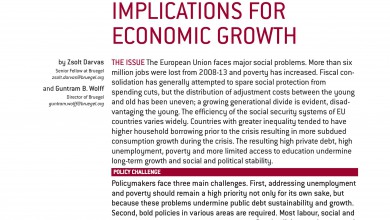The issue
Access to the single market is one of the core benefits of the United Kingdom’s membership of the European Union. A vote to leave the EU would trigger difficult negotiations on continued access to that market. However, the single market is not static. One of the drivers of change is the necessary reforms to strengthen the euro. Such reforms would not only affect the euro’s fiscal and political governance. They would also have an impact on the single market, in particular in the areas of banking, capital markets and labour markets. This is bound to affect the UK, whether it remains in the EU or not.
The policy challenge
A defining characteristic of the banking, capital and labour markets is a high degree of public intervention. These markets are all regulated, and have implicit or explicit fiscal arrangements associated with them. Deepening integration in these markets will likely therefore require governance integration, which might involve only the subset of EU countries that use the euro. Since these countries constitute the EU majority, safeguards are needed to protect the legitimate single market interests of the UK and other euro-outs. But the legitimate interest of the euro-area majority in deeper market integration to bolster the euro should also be protected against vetoes from the euro-out minority.
This new policy brief was first published on Bruegel and can be downloaded here.


